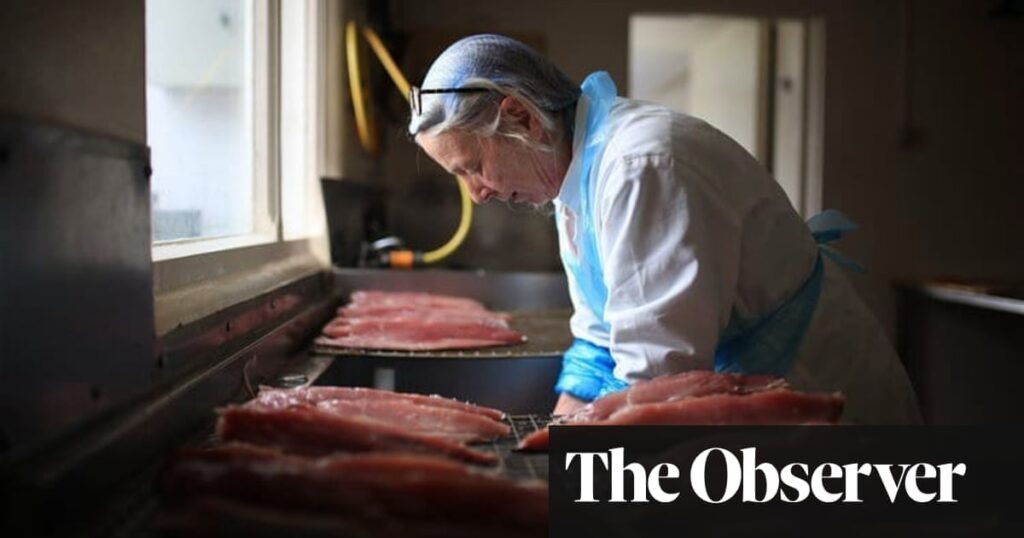World’s largest food awards move judging panel from UK to Ireland to avoid Brexit red tape | Brexit

The Great Taste awards are a British success story – the world’s largest food awards, celebrating the best products on the planet. But new post-Brexit import controls have forced the organisers to hold a judging panel outside the UK for the first time in the awards’ 30-year history.
On Sunday, judges from the Guild of Fine Foods panel will travel to County Tipperary in Ireland to spend three days tasting products that have become much harder to bring to the UK.
Since January, anyone sending meat, dairy or fish products to the UK has to find a vet to fill out a seven-page form showing that the product is disease-free. And since April, exporters have also had to pay a fee of £29 for each product, whether it’s a container full of Irish beef or a single packet of Tayto cheese and onion crisps, unless they are for personal use. This includes the 13,672 samples sent to the Great Taste judges from 115 countries.
John Farrand, the managing director of the Guild of Fine Food, said: “The friction at the borders has tripped us up this year. We’re a bellwether for the wider problems in the market. It’s irritating for us because it’s going to cost us a lot more money to go and judge in Ireland. We’re going to judge [in Clonmel, Co Tipperary] to help the smaller food and drink producers who can’t cope with the paperwork and the cost.”
Some judging will still take place in the UK. Sally Ferns Barnes, a Scot who founded the Woodcock Smokery in West Cork in 1981 and won supreme champion at the 2006 Great Taste awards for her cold-smoked wild Atlantic salmon, is not entering this year. “We used to send entries every year,” she said. “It was a wonderful yardstick for us because you’re up against [about] 10,000 other products. When you win, you think, ‘I must be doing something right here’.
“I didn’t enter because I thought, ‘what’s the point – I can’t offer it to customers in the UK any more.’ ”
Barnes is the last Irish producer working exclusively with wild salmon – she refuses to use farmed salmon, and this creates a problem with the paperwork to export to the UK.
Fish get a “catch certificate” when they are landed to prove their origin, and Barnes needs this certificate to be able to apply for a vet’s health certificate to export to the UK. “An issue with wild salmon is that you don’t get catch certificates because it’s a freshwater fishery,” she said. “It’s not sea fisheries. So I’ve been trying to pester the [Irish] inland fisheries for information. They don’t know. They’ve never dealt with this. So they don’t know what to do.”
Neal’s Yard Dairy has previously sold Barnes’s salmon and had offered to include her in a regular shipment it is running for seven Irish cheesemakers, but she has not felt able to accept.
“If I don’t get it [the paperwork] 100% right and there’s one tiny thing wrong, the entire consignment would be delayed,” she said. “And you can’t do that with cheeses. I would be so deeply unpopular with all my cheesemaker friends.
“I’ve spoken to other producers who would have been exporting, and most of them are not interested any more. We’ll look to Europe instead.”
The possibility that a paperwork error will mean that entire consignments are delayed or even destroyed is a major risk for small food exporters like Barnes.
Border controls for the new Brexit red tape will cost at least £4.7bn, the National Audit Office said last week, and importers have complained that perishable shipments of food and flowers have faced delays, some up to 20 hours long, because computer systems have failed.
after newsletter promotion
Overall, the cost of importing alone is likely to add £1bn to the UK’s food bill, according to the Cold Chain Federation, although the government estimates the cost will be £330m a year. Fruit and vegetables are not yet subject to the new rules but are expected to be included from October.
The import controls also affect suppliers to larger retailers, including supermarkets, who may need to send samples out to dozens of product buyers at different organisations on several occasions before they are accepted on to the supermarket shelves. So while someone sending a pot of French jam to a supermarket buyer in the UK would have spent a few euros per sample before Brexit, now they would spend closer to €100.
“There is a huge irony here that the government is telling us to do more trade with Europe and the rest of the world in light of Brexit,” Farrand said. “And we’re busy trying to get business with retailers, but the movement of samples is being affected by border controls.
“We are removing the colour, diversity and interest in our food and drink. We’re going to end up with fewer suppliers. That’s bad for our economy and for our nutrition.”
A government spokesperson said: “These border checks are fundamental to protecting the UK’s food supply chain, farmers and natural environment against costly diseases reaching our shores.
“Our robust analysis has shown they will have minimal impact on food prices and consumers, with just a 0.2% point increase on food prices over the next three years.
“The cost of checks is negligible compared to the impact of a major disease outbreak, such as foot and mouth disease in 2001, which cost our economy more than £12.8bn in 2022 prices.”
Source: theguardian.com

